Early diagnosis of Attention-Deficit/Hyperactivity Disorder (ADHD) in children is critical for timely intervention and treatment. The study titled "Is there any incremental benefit to conducting neuroimaging and neurocognitive assessments in the diagnosis of ADHD in young children? A machine learning investigation" offers invaluable insights for practitioners in the field. This blog will explore the study's findings and discuss how they can be implemented to improve ADHD diagnostic practices.
The Study's Core Findings
The research employed machine learning to evaluate the predictive value of various measures, including parent/teacher ratings, behavioral performance in executive function (EF) tasks, and neural measures of cortical thickness. The study analyzed data from 162 children aged 4-7 years, focusing on the following:
- Parent/Teacher Ratings of EF
- Behavioral Performance in EF Tasks
- Neural Measures of Cortical Thickness
Among these measures, teacher ratings of EF emerged as the most predictive of ADHD. The study found that while neuroimaging and cognitive measures provide additional information, they offer minimal incremental value in distinguishing typically developing children from those diagnosed with ADHD.
Implementing Study Outcomes in Practice
The findings have several practical implications for practitioners aiming to enhance their diagnostic accuracy and efficiency:
Prioritize Teacher Ratings
The study highlights the critical importance of teacher ratings in diagnosing ADHD. Practitioners should:
- Collect comprehensive teacher ratings of EF using standardized tools like the Behavior Rating Inventory of Executive Function (BRIEF).
- Incorporate teacher observations into the diagnostic process, as they provide significant insights into a child's functional impairments in school settings.
Utilize Behavioral EF Assessments
While teacher ratings are paramount, behavioral EF tasks also contribute valuable information. Practitioners should consider:
- Administering tasks like the Flanker Task, Dimensional Change Card Sorting Task (DCCS), and Head-Toes-Knees-Shoulders (HTKS) Task to assess EF performance.
- Using these tasks to complement teacher ratings, providing a more holistic view of the child's EF capabilities.
Minimize Reliance on Neuroimaging
Given the minimal incremental value of neuroimaging in distinguishing ADHD, practitioners can:
- Limit the use of expensive and time-consuming neuroimaging techniques for simple diagnostic purposes.
- Reserve neuroimaging for cases where additional information on underlying cognitive deficits is necessary.
Encouraging Further Research
While the study provides critical insights, it also underscores the need for ongoing research. Practitioners are encouraged to:
- Participate in or support studies exploring the utility of neuroimaging and neurocognitive assessments in predicting functional impairments and comorbid conditions.
- Stay updated on emerging research to continually refine diagnostic practices.
Conclusion
The study's findings emphasize the pivotal role of teacher ratings in diagnosing ADHD and suggest that neuroimaging and behavioral assessments offer limited additional value. By prioritizing teacher ratings and utilizing behavioral EF tasks, practitioners can enhance their diagnostic accuracy and efficiency. Continued research is essential to further refine these practices and improve outcomes for children with ADHD.To read the original research paper, please follow this link:
Is there any incremental benefit to conducting neuroimaging and neurocognitive assessments in the diagnosis of ADHD in young children? A machine learning investigation.










